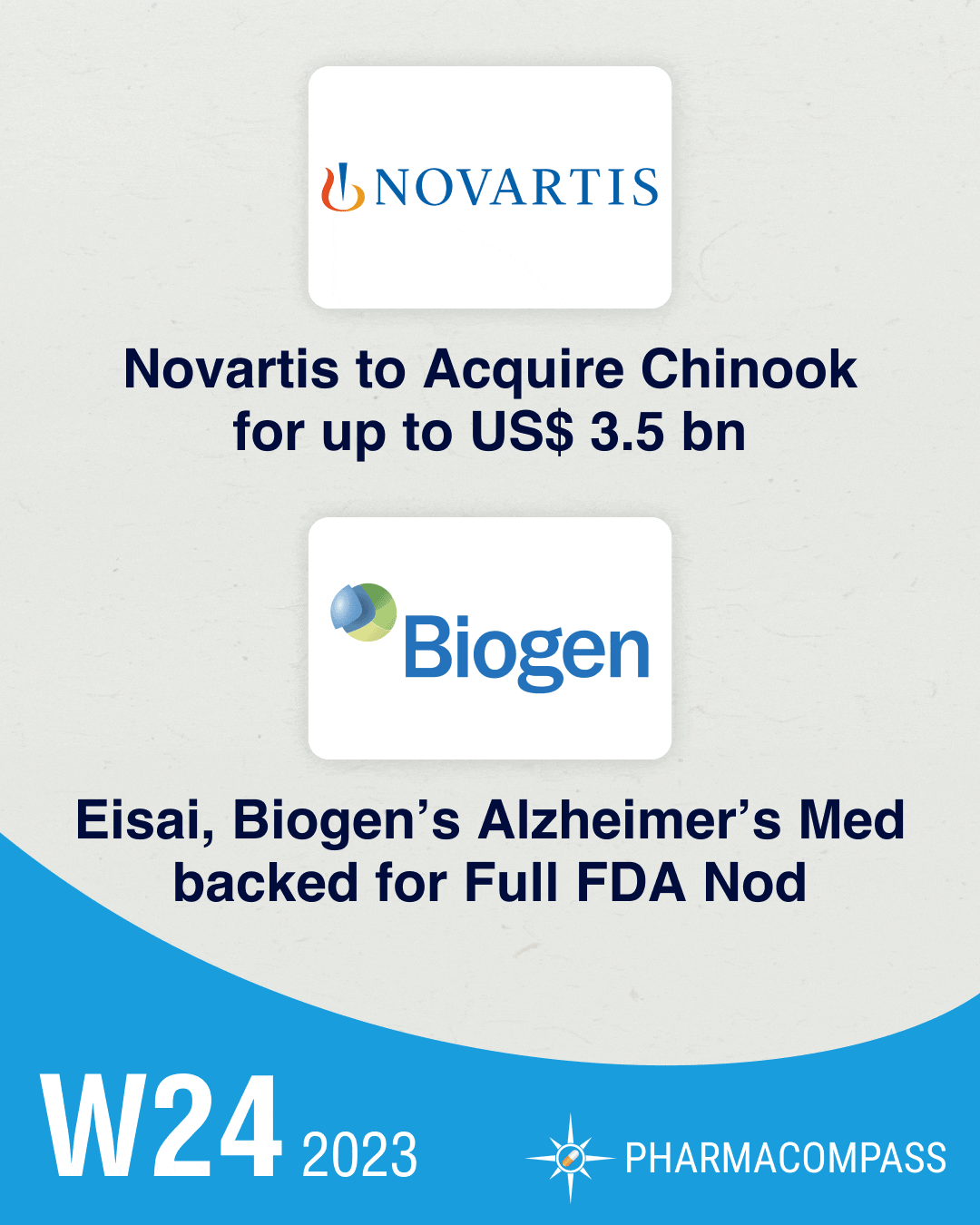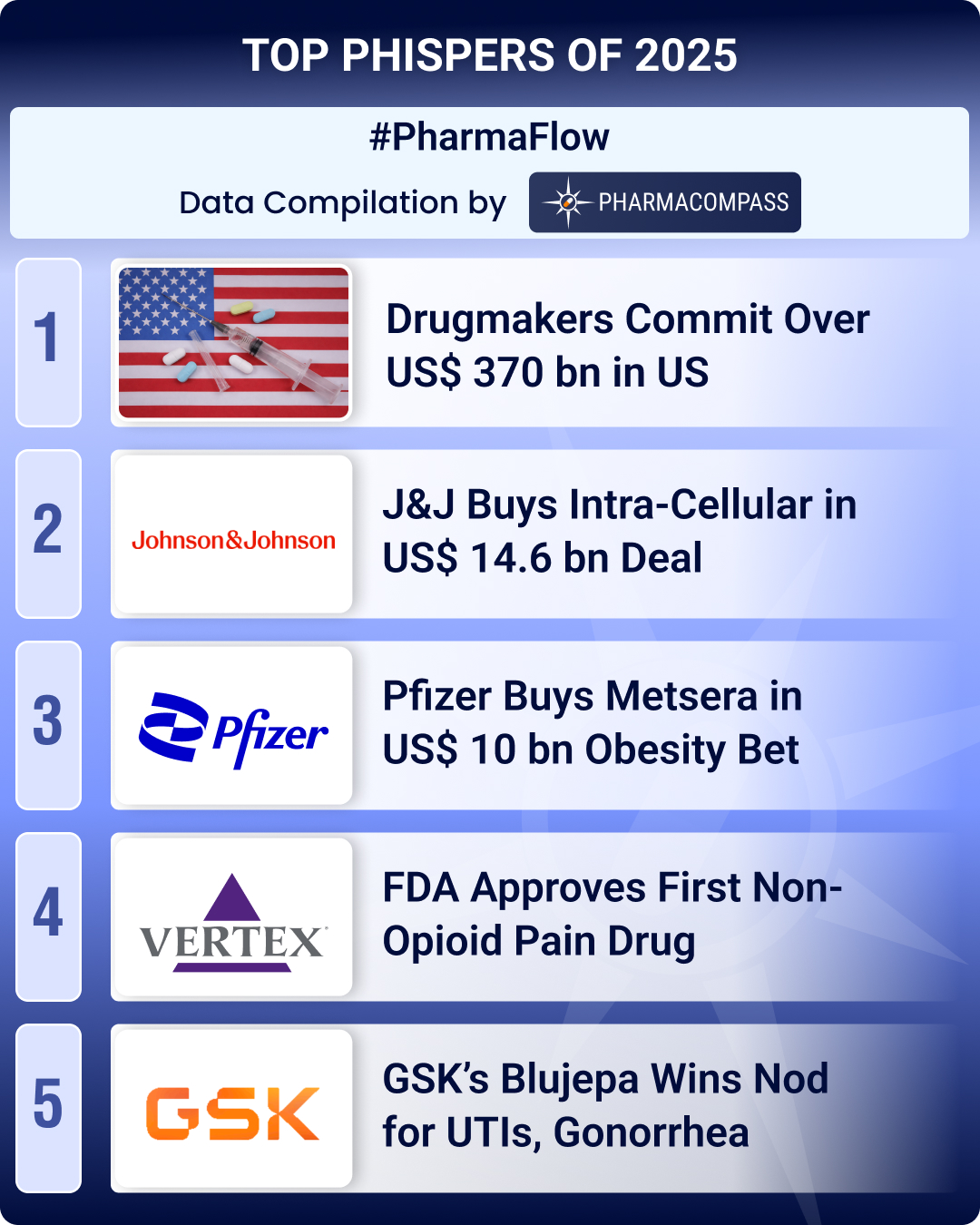
By PharmaCompass
2023-06-15
Impressions: 1,342 Article
A few days after Merck sued the US government over the Inflation Reduction Act (IRA), the US Chamber of Commerce filed a lawsuit arguing that the new law violates drugmakers’ constitutional rights and grants excessive control over prices to the government. Amid soaring drug shortages, Pfizer has said a penicillin-based drug used to treat syphilis and other bacterial infections in children could be out of supply in the US by June-end.
The Biden administration has decided to impose penalties on 43 drugs for raising prices within Medicare at a rate faster than inflation.
In dealmaking news, Novartis is acquiring US biotech Chinook Therapeutics for up to US$ 3.5 billion. Novo Nordisk is investing DKK 15.9 billion (around US$ 2.3 billion) to expand the manufacturing capacity for chronic disease medicines at its existing API plant in Denmark. Pfizer has inked a US$ 411 million deal with Samsung Biologics for manufacturing biosimilars. And Biogen has teamed up with NeuroSense Therapeutics for an ALS biomarker study.
A panel of external experts to the US Food and Drug Administration (FDA) has backed Eisai and Biogen’s drug Leqembi for the treatment of early-stage Alzheimer’s disease. FDA advisers have also voted in favor of Sanofi and AstraZeneca’s experimental antibody nirsevimab to prevent respiratory syncytial virus (RSV) infections in infants.
In regulatory news, Indian authorities have launched an inquiry into allegations that a local pharmaceutical regulator accepted a bribe to switch samples of cough syrups that were linked to child deaths in The Gambia prior to testing the samples in a government lab. FDA has issued a Form 483 with 11 observations to Ipca Laboratories’ API manufacturing facility in India. And 2seventy bio has halted a pediatric cancer trial after the death of a patient.
After Merck, trade body sues US govt over IRA; Lilly CEO voices concerns
Last week, Merck had filed a lawsuit against the US government to prevent Medicare from negotiating lower drug prices under the Inflation Reduction Act (IRA). Days later, the US Chamber of Commerce, one of the most influential trade groups in the US, filed a separate lawsuit, arguing that the negotiations violate drugmakers’ constitutional rights and granted excessive control over prices to the government.
After CEOs of Biogen and Novartis, Eli Lilly’s CEO David Ricks has also criticized the Medicare price negotiations, citing concerns about their potential impact on drug development. Ricks said these negotiations could significantly impede investment in small molecule drugs.
Pfizer to run out of pediatric antibiotic soon: Amid soaring drug shortages, Pfizer has warned that a penicillin-based drug used to treat syphilis and other bacterial infections in children could run out of supply in the US by June-end.
US govt imposes penalties for excessive price hikes: The US government will impose penalties on manufacturers of 43 prescription drugs for raising prices within Medicare at a rate faster than inflation. The government had imposed fines on 27 drugs earlier this year.
Novartis to acquire Chinook for up to US$ 3.5 billion for its nephrology portfolio
Novartis is set to acquire US biotech Chinook Therapeutics for up to US$ 3.5 billion in order to bolster its portfolio of kidney disease drugs. Under the agreement, Chinook shareholders will receive US$ 3.2 billion in cash and will be eligible for up to US$ 300 million in milestone payments. The drugmakers expect to complete the transaction in the second half of 2023.
Biogen, NeuroSense team up for ALS biomarker study: Biogen has teamed up with Israel-based NeuroSense Therapeutics to conduct a biomarker study for the latter’s lead asset PrimeC – a combination of ciprofloxacin and celecoxib – in patients with amyotrophic lateral sclerosis (ALS). Biogen will finance and analyze the study.
Novo to invest US$ 2.3 billion in Denmark plant: Novo Nordisk is investing DKK 15.9 billion (around US$ 2.3 billion) at its existing API facility in Denmark to expand its manufacturing capacity for chronic disease medicines.
Pfizer inks deal with Samsung Biologics: Pfizer has inked a US$ 411 million deal with Samsung Biologics for manufacturing biosimilars. As part of the deal, Samsung will pledge additional capacity for large-scale manufacturing of biosimilars that cover therapeutic areas such as oncology, inflammation and immunology.
India probes bribery charges against local drug regulator in Gambian deaths case
Indian authorities have launched an inquiry into allegations that a local pharmaceutical regulator accepted a bribe to switch samples of cough syrups that were linked to child deaths in The Gambia. A lawyer has accused Haryana state’s drug controller Manmohan Taneja of accepting ₹50 million (US$ 609,454) bribe from Maiden Pharmaceuticals to swap the samples prior to testing in an Indian government laboratory.
FDA panel backs full approval of Eisai-Biogen’s Alzheimer’s drug Leqembi
In January, Eisai and Biogen’s Alzheimer’s drug Leqembi had won FDA’s accelerated approval based on its ability to remove sticky amyloid plaques from the brain. Now, a panel of external experts to the FDA has unanimously confirmed the treatment’s benefit for early-stage patients, supporting a full approval of the drug. A decision on the drug’s full approval is expected by July 6. If approved, Leqembi would be the first disease-modifying drug for this condition.
Endorses use of Sanofi-Astra’s RSV antibody in infants: FDA advisers have unanimously voted for the use of Sanofi and AstraZeneca’s experimental antibody — nirsevimab — to prevent RSV infections in infants. The advisers have also endorsed the drug’s use in children up to two years who are at risk of developing severe illness during their second RSV season. FDA is expected to take a decision on the drug’s approval by Q3 2023.
Meanwhile, Merck’s experimental drug efinopegdutide has received fast track designation from the FDA as a potential treatment for patients with nonalcoholic steatohepatitis (NASH), a type of fatty liver disease. Currently, there are no approved therapies for NASH.
Ipca Labs’ API facility in India gets FDA’s Form 483; 2seventy bio halts cancer trial
FDA has issued a Form 483 with 11 observations to Ipca Laboratories’ API manufacturing facility situated at Ratlam in Madhya Pradesh (India). The agency had inspected the facility from June 5 to 13. The generics drugmaker said it plans to submit its response on the observations soon.
Pediatric cancer drug trial halted after patient death: An early-phase trial of 2seventy bio’s experimental cancer therapy for pediatric acute myeloid leukemia has been halted following the death of a patient. The patient was the initial recipient in the second dose group of the trial. An investigation is underway to determine the cause of death.
The PharmaCompass Newsletter – Sign Up, Stay Ahead
Feedback, help us to improve. Click here
Image Credit : Phisper Infographic by PharmaCompass license under CC BY 2.0
“ The article is based on the information available in public and which the author believes to be true. The author is not disseminating any information, which the author believes or knows, is confidential or in conflict with the privacy of any person. The views expressed or information supplied through this article is mere opinion and observation of the author. The author does not intend to defame, insult or, cause loss or damage to anyone, in any manner, through this article.”







